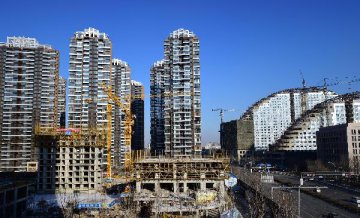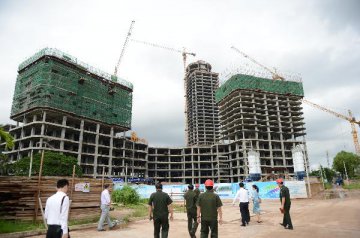Land sales gained significantly in major Chinese cities as the country increased land supply to stabilize home prices.
Land sales in 50 big cities monitored by real estate agent Centaline Group jumped 48.6 percent year on year to 1.32 trillion yuan (more than 205 billion U.S. dollars) by the end of the third week this month. Hangzhou, in east China's Zhejiang Province, saw the biggest increase of 270 percent.
A total of 46 first- and second-tier cities had their land sales exceed 10 billion yuan, including Wuhan, Fuzhou, Guangzhou and Zhengzhou, the Centaline report showed.
The land premium rate, which measures the extent to which highest-bidding property developers pay in excess of the starting price for land, remained tame at around 10 percent on average, much lower than the 30 percent during the past three years.
China's property market, once deemed a major risk for the broader economy, cooled in 2017 amid tough curbs such as purchase restrictions and higher downpayment requirements as the government sought to rein in speculation.
For 2018, the government vowed to maintain its property regulation and introduce a long-term mechanism for the real estate market, with differentiated land supply policies for varying cities considered an important part.
Land sales in 50 big cities monitored by real estate agent Centaline Group jumped 48.6 percent year on year to 1.32 trillion yuan (more than 205 billion U.S. dollars) by the end of the third week this month. Hangzhou, in east China's Zhejiang Province, saw the biggest increase of 270 percent.
A total of 46 first- and second-tier cities had their land sales exceed 10 billion yuan, including Wuhan, Fuzhou, Guangzhou and Zhengzhou, the Centaline report showed.
The land premium rate, which measures the extent to which highest-bidding property developers pay in excess of the starting price for land, remained tame at around 10 percent on average, much lower than the 30 percent during the past three years.
China's property market, once deemed a major risk for the broader economy, cooled in 2017 amid tough curbs such as purchase restrictions and higher downpayment requirements as the government sought to rein in speculation.
For 2018, the government vowed to maintain its property regulation and introduce a long-term mechanism for the real estate market, with differentiated land supply policies for varying cities considered an important part.





















Latest comments